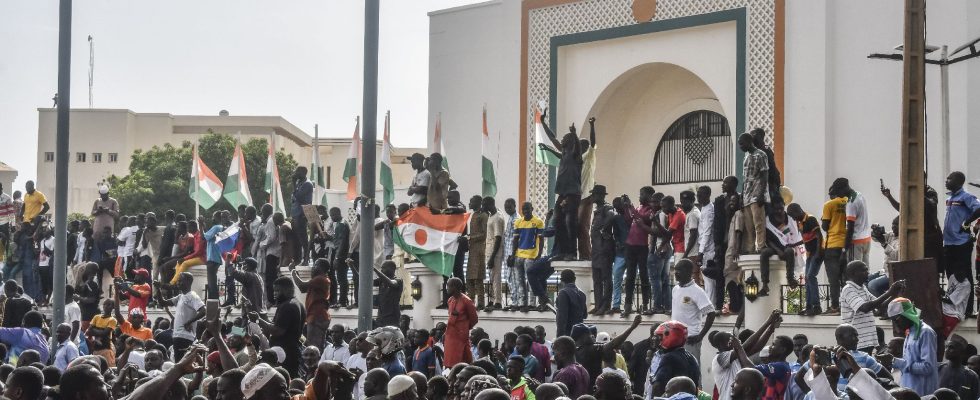They were among the first to support the military coup in Niger. On July 27, the day after the putsch against the elected president Mohamed Bazoum, the militants of the “M62” are busy making their declaration to the press, at their headquarters, called “center Thomas Sankara”, named after the revolutionary president of Burkina Faso and African icon of the anti-imperialist struggle. Quite a symbol. “The M62 nurtures the hope that this coup will be the ultimate opportunity to repair the excesses of the fallen regime and restore the dignity of the Nigerien people”then declared its secretary general Mahaman Sanoussi, who has not ceased, in recent years, to denounce the presence of the French army in his country, yet a faithful ally of Paris in the fight against terrorism in the Sahel.
A few days later, when General Abdourahamane Tiani, the leader of the junta, brandished the threat of“a plan of aggression” prepared by “African countries” And “westerners” on television, the M62 activates to block the streets. His watchword, launched on social networks: go out en masse to “warn ECOWAS and the international community, particularly France, against foreign military intervention” which would aim to restore President Bazoum, but also to demand, once again, “immediate departure” soldiers and the French ambassador.
Anti-French slogans
Sunday, July 30, cries of joy mingle with those of anger. Several thousand demonstrators invaded the Place de la Concertation, in the heart of the capital, to support the junta. In front of the French Embassy, a tricolor flag is burned and slogans against the former colonial power rumble. While it remains unclear for the time being whether the new self-proclaimed strongman of Niamey enjoys the support of the population, and while the deposed regime calls on its supporters to resist, Sunday’s demonstration gave the opportunity to certain voices, long suppressed, to make themselves heard. In the streets, in addition to the sovereignists of the “M62”, we hear many young people, but also militants of the political opposition, rallied to the putschists.
And for good reason: since the first march of the “M62” in September 2022, which brought together several hundred people in Niamey, several of its demonstrations had then been banned by the authorities for security reasons. Last April, its leader, Abdoulaye Seydou, was sentenced to nine months in prison for “dissemination of data likely to disturb public order”after having denounced blunders of the Nigerien army against civilians, during a military operation.
From Burkinabe M30 to Nigerian M62
No doubt the supporters of the “M62” admire the neighboring putschists, the Malian Assimi Goïta and the Burkinabé Ibrahim Traoré, who turned to Russia and pushed the French soldiers towards the exit, marking the end of Operation Barkhane in 2022, after nine years of anti-jihadist struggle in the region. In Ouagadougou, the Burkinabés of the “M30 Naaba Wobgo” had just created their movement to demand the breaking of the defense agreements with Paris, when, a few days later, on August 3, 2022, the “M62” followed suit, choosing its name in tribute to the 62nd anniversary of the proclamation of the independence of Niger. Its organizers, who claim “anti-imperialists” And “peaceful”begin by denouncing the increase in the price of gas, the high cost of living, the security crisis, then the presence of the French army in Niger. “It is first and foremost an opposition movement that criticizes the socio-economic situation, bad governance and the corruption affairs of power”explains Rahmane Idrissa, researcher in political science at the African Studies Center of the University of Leiden (Netherlands), for whom this structure, which brings together some fifteen civil society organizations, remains “minority, but no less audible” in part of the population, nearly 40% of whom live below the poverty line.
influence war
In the meantime, the Malian and Burkinabe juntas, which are also gambling on their survival, are increasing the pressure. Monday evening, in reaction to the ultimatum of ECOWAS, which gave it a week’s deadline for a return to constitutional order, declaring not to exclude a “use of force”Bamako and Ouagadougou threatened that military intervention would be “a declaration of war”, against their countries. The battle for information is raging. Thus, the supporters of Captain Ibrahim Traoré multiply the intox incriminating France and the messages of support for General Tiani. It was from Burkina Faso, moreover, that in 2019, a rumor started, accusing a supply convoy of the French army of “carry weapons for terrorists”.
At the time, the column of vehicles had been blocked for several days by Burkinabe demonstrators, before being again blocked by the crowd in Tera, in western Niger. Three demonstrators were killed in the clashes, without the investigations carried out by the Nigerien and French authorities making it possible to determine the circumstances of their death. In Niger, and more generally in the Sahel, “Young people are very connected and thirsty for information. They see French planes take off from the Niamey base and at the same time hear about a new attack on their phone. There is a feeling of incomprehension, of frustration with the action of their soldiers in the country”, summarizes Amadou Hassane Boubacar, teacher-researcher at the University of Niamey. Faced with criticism, the new French military force deployed in Niger, which has 1,500 soldiers, had been redesigned for a more discreet partnership, says “of fight” alongside Nigerian soldiers. In vain.
